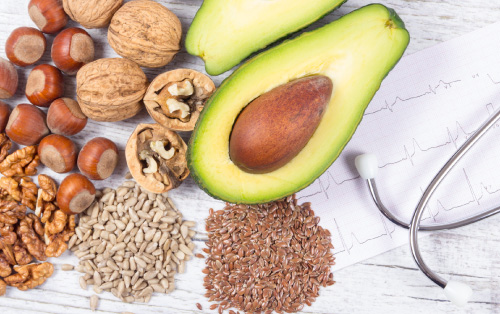Omega-3s for Better Health

With all the things we are constantly learning about to eat for better health, let us not forget the mighty Omega-3 molecule. It can sometimes be forgotten in the shuffle of getting more broccoli, kale and berries into our daily diets. There is quite a bit of science on the importance of Omega-3s in health and sickness. Today we are going to look at an article written by Kris Gunnars, BSc named "Omega-3 Fatty Acids - The Ultimate Beginner's Guide."
Omega-3 fatty acids are essential fats that you must get from your diet. These incredibly healthy fats have important benefits for your body and brain. However, most people who eat a standard Western diet are not eating nearly enough omega-3 fats. This is the ultimate beginner’s guide to omega-3 fatty acids.
Omega-3, or n-3, fatty acids, are a family of polyunsaturated fats that you must get from your diet. They’re termed essential fatty acids, as they’re needed for health, but your body cannot produce them as it can other fats. As polyunsaturated fatty acids, their chemical structure has several double bonds. Omega-6 fatty acids are another type of polyunsaturated fat. The "omega" naming convention has to do with the placement of the double bond in the fatty acid molecule. Omega-3s have the first double bond placed three carbon atoms away from the omega end.
The 3 main types of omega-3 fats
There are many fatty acids that belong to the omega-3 family. The most important ones are EPA, DHA, and ALA.
EPA (eicosapentaenoic acid)
EPA is a 20-carbon-long omega-3 fatty acid. It’s primarily found in fatty fish, seafood, and fish oil. Also found in sea vegetables. This fatty acid has many essential functions. Most importantly, it’s used to form signaling molecules called eicosanoids. These can reduce inflammation. EPA has been shown to be particularly effective against certain mental conditions, especially depression .
DHA (docosahexaenoic acid)
DHA is a 22-carbon-long omega-3 fatty acid. It is primarily found in fatty fish, seafood, fish oils, and algae. The main role of DHA is to serve as a structural component in cell membranes, particularly in nerve cells in your brain and eyes. It makes up about 40% of polyunsaturated fats in your brain. DHA is very important during pregnancy and breastfeeding. It’s absolutely crucial for the development of the nervous system. Breast milk may contain significant amounts of DHA, depending on the mother’s intake.
ALA (alpha-linolenic acid)
ALA is an 18-carbon-long omega-3 fatty acid. It’s the most common dietary omega-3 fatty acid, found in certain high-fat plant foods, especially flax seeds, chia seeds, and walnuts. Aside from being used for energy, ALA doesn’t have many biological functions. Nevertheless, it’s categorized as an essential fatty acid. This is because your body can convert it into EPA and DHA, omega-3 fatty acids with various essential, biological functions. However, this process is highly inefficient in humans. According to one estimate, only about 5% of ALA gets converted into EPA, and as little as 0.5% into DHA. For this reason, ALA should never be relied on as your sole omega-3 source. Most of the ALA you eat will simply be used for energy.
Health benefits of omega-3 fatty acids
Omega-3 fatty acids are among the world’s most comprehensively studied nutrients.They have been shown to have powerful health benefits on the following conditions:
- Blood triglycerides. Omega-3 supplements can significantly lower blood triglycerides.
- Cancer. Eating foods high in omega-3 has been linked to a reduced risk of colon, prostate, and breast cancers. Still, not all studies agree.
- Fatty liver. Taking omega-3 fatty acid supplements can help get rid of excess fat from your liver.
- Depression and anxiety. Taking omega-3 supplements, such as fish oil, can help reduce symptoms of depression and anxiety.
- Inflammation and pain. Omega-3s can reduce inflammation and symptoms of various autoimmune diseases, such as rheumatoid arthritis. They’re also effective at reducing menstrual pain.
- ADHD. In children with ADHD, omega-3 supplements can significantly improve various symptoms.
- Asthma. Omega-3s may help prevent asthma in children and young adults.
- Baby development. DHA taken during pregnancy and breastfeeding can improve your baby's intelligence and eye health.
- Dementia. Some studies link a higher omega-3 intake to a reduced risk of Alzheimer's disease and dementia.
Despite improving several risk factors for heart disease, omega-3 fatty acids have not been shown to prevent heart attacks or strokes. The largest review studies found no benefit.
How much omega-3 to take for optimal health
Mainstream health organizations like the World Health Organization (WHO) and European Food Safety Authority (EFSA) recommend a minimum of 250–500 mg combined EPA and DHA each day for healthy adults. The American Heart Association recommends eating fatty fish at least twice per week to ensure optimal omega-3 intake for heart disease prevention.For pregnant and breastfeeding women, it’s recommended to add an additional 200 mg of DHA on top of the recommended intake. The National Academies of Sciences, Engineering, and Medicine have also developed intake recommendations for ALA. For adults, the recommended intake is 1.6 and 1.1 grams per day for men and women, respectively.
If you’re trying to improve a specific health condition, ask your healthcare provider for dosage recommendations. Keep in mind that your omega-6 intake may partly determine how much omega-3 you need. Cutting back on omega-6 may reduce your requirement for omega-3.
Should you take an omega-3 supplement?
In fact, most of the studies on the benefits of omega-3 use supplements. Good EPA and DHA supplements include fish, krill, and algal oils. For vegetarians and vegans, taking a DHA supplement made from algae is recommended. When it comes to omega-3 supplements, there are many choices and not all of them are good. Some may even contain harmful compounds due to pollution. Be sure to educate yourself before buying a supplement.
Safety and side effects
When it comes to nutrition, more is not always better. As with most nutrients, there is an upper limit for how much you should take. According to the Food and Drug Administration (FDA), taking up to 2,000 mg of combined EPA and DHA per day from supplements is safe. In high doses, omega-3s have blood-thinning effects. Speak to your doctor if you have a bleeding disorder or are taking blood thinning medications. Cod liver oil is also very high in vitamin A, which can be harmful in large doses. Make sure to read and follow the dosage instructions.
